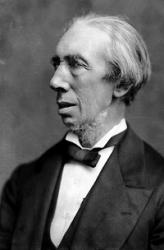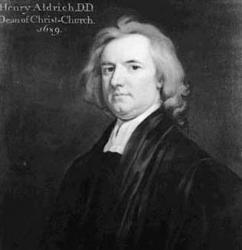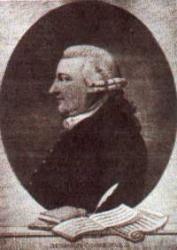Planning worship?
Check out our sister site, ZeteoSearch.org,
for 20+ additional resources related to your search.
- |
User Links
Person Results
William Hayes

1706 - 1777 Person Name: W. Hayes Composer of "[O be joyful in the Lord all ye lands: serve the Lord with gladness]" in University Hymns William Hayes (26 January 1708 (baptised) – 27 July 1777) was an English composer, organist, singer and conductor.
Hayes was born in Gloucester. He trained at Gloucester Cathedral and spent the early part of his working life as organist of St Mary’s, Shrewsbury (1729) and Worcester Cathedral (1731). The majority of his career was spent at Oxford where he was appointed organist of Magdalen College in 1734, and established his credentials with the degrees of B.Mus in 1735 and D.Mus in 1749. (He was painted by John Cornish in his doctoral robes around 1749.) In 1741 he was unanimously elected Professor of Music and organist of the University Church. He presided over the city’s concert life for the next 30 years, and was instrumental in the building of the Holywell Music Room in Oxford in 1748, the oldest purpose-built music room in Europe. He was one of the earliest members of the Royal Society of Musicians, and in 1765 was elected a ‘privileged member’ of the Noblemen’s and Gentlemen’s Catch Club. He died in Oxford, aged 69.
William Hayes was an enthusiastic Handelian, and one of the most active conductors of his oratorios and other large-scale works outside London. His wide knowledge of Handel left a strong impression on his own music, but by no means dominated it. As a composer he tended towards genres largely ignored by Handel—English chamber cantatas, organ-accompanied anthems and convivial vocal music—and his vocal works show an English preference for non-da capo aria forms. Hayes also cultivated a self-consciously ‘learned’ polyphonic style (perhaps inspired by his antiquarian interests) which can be seen in his many canons, full-anthems, and the strict fugal movements of his instrumental works. Nevertheless, several of his late trio sonatas show that he was not deaf to newly emerging Classical styles. Although he published virtually none of his instrumental music, his vocal works were extremely popular, and the printed editions were subscribed to by large numbers of amateur and professional musicians. Substantial works like his ode The Passions, the one-act oratorio The Fall of Jericho, and his Six Cantatas demonstrate that Hayes was one of the finest English composers of the eighteenth century.
As a writer, his Art of Composing Music includes the first published description of aleatoric composition—music composed by chance—albeit deliberately satirical in intent. In his Remarks he reveals much about his aesthetic outlook: in particular that he valued the music of Handel and Corelli over that of Rameau, Benedetto Marcello and Geminiani. Finally, the Anecdotes offer insights into the organization of provincial music festivals in the mid-eighteenth century. Hayes bequeathed his important and wide-ranging music library to his son Philip Hayes; the manuscripts of both father and son eventually passed to the Bodleian Library, Oxford, in 1801.
Sacred works
The Fall of Jericho, oratorio, c. 1740–50
Sixteen Psalms (London, 1773)
David, oratorio, completed by Philip Hayes
around 20 anthems and service music, in Cathedral Music in Score, edited by Philip Hayes (Oxford, 1795)
--en.wikipedia.org/wiki
William Hayes
George A. Macfarren

1813 - 1887 Person Name: Sir G. A. Macfarren, 1813-87 Composer of "[O be joyful in the Lord all ye lands]" in The Book of Common Praise George Alexander Macfarren, Mus. Doc.; b. London, 1813; d. London, 1887
Evangelical Lutheran Hymnal, 1908
=======================
Born: March 2, 1813, Westminster, England.
Died: October 31, 1887, St. Marylebone, England.
Buried: Hampstead Cemetery, London, England.
Brother of Walter Macfarren, George was a principal of the Royal Academy of Music; professor at Cambridge University; conductor at Covent Garden, London; program note writer for the Philharmonic Society; and editor of Handel and Purcell. He wrote 18 operas, 13 oratorios and cantatas, 9 symphonies, and 162 songs. He went blind in 1860, and was knighted in 1883.
Sources:
Frost, p. 681
Lightwood, p. 189
Nutter, p. 460
http://www.hymntime.com/tch/bio/m/a/c/macfarren_ga.htm
===============================
http://en.wikipedia.org/wiki/George_Alexander_Macfarren
George A. Macfarren
Pelham Humfrey
1647 - 1674 Person Name: Pelham Humphrey, 1647-1674 Composer of "[O be joyful in the Lord all ye lands]" in The Book of Praise
Pelham Humfrey
Henry Aldrich

1647 - 1710 Person Name: Henry Aldrich Composer of "JUBILATE DEO" in The Hymnal Henry Aldrich, an English composer, born 1657; died 1710; his library is at Oxford College.
A Dictionary of Musical Information by John W. Moore, Boston: Oliver, Ditson & Company, 1876
Henry Aldrich
Edward F. Rimbault

1816 - 1876 Person Name: E. F. Rimbault Composer of "[O be joyful in the Lord all ye lands] (Rimbault)" in The Church Hymnal Edward Francis Rimbault PhD LLD United Kingdom 1816-1876. Born in Soho, London, England, son of an organist and composer of French descent, he was taught music by his father., Samuel Wesley, and Wiliam Crotch. At age 16 he became organist of the Swiss Church in Soho. He later became organist at various churches, including St Peter’s, Vere Street, and St John’s Wood Presbyterian Church. He edited many collections of music, journals, and publications of music, and arranged music compositions. In addition to editing or arranging contemporary operas, he had a strong interest in editing or arranging earlier English music. He studied the musical treatises in the library of Archbishop Tenison, one of the oldest public libraries in London. In 1838, At age 22 he began lecturing about the history of English music, and was in much demand due to the interest aroused. He did editorial work for the Percy Society, the Camden Society, the Motet Society, and the Handel Society. For the latter he edited the “Messiah”, “Saul”, and “Samson” He was elected a Fellow of the Society of Antiquaries, and was granted membership in the Academy of Music in Stockholm, Sweden. Gottingen University also conferred upon him a PhD. His reputation was such that he was offered a teaching position at Harvard University in the U.S., which he turned down. In 1848 he was given an honorary degree by the University of Oxford. In 1849 he published a collection of English nursery rhymes and the tunes to which they were sung. Rimbault authored 76 books, a few named here include : “Bibliotheca madrigaliana” (1847); “The pianoforte” (1860); “Early English organ builders and their works” (1865). In 1855 he co-authored “The organ- its history and construction” with John Hopkins. He did a small amount of composing as well. He wrote an operetta in 1838, and a musical drama. He also composed a large number of pianoforte scores for operas by others. He was an admirable harmonium player. Traveling to various auctions for years, he accumulated a rare collection of books. After his death his extensive collection was auctioned off in 1877, with many items going to the British Library. About 300 items were sold to an individual, and upon his death in 1888, the ‘Drexel collection’ was bequeathed to the Lenox Library (precursor of the New York Public Library). Today, the collection is part of the Music Division of the NY Public Library for the Performing Arts. He was an author, editor, arranger, composer, lithographer, translator, scribe, adapter, and bookseller. He died at London, England. No information found regarding a family.
John Perry
Edward F. Rimbault
Garret Colley Wellesley, Earl of Mornington
1735 - 1781 Person Name: mornington Composer of "[O be joyful in the Lord; all ye lands]" in The Tribute of Praise Garret Colley Wellesley, Earl of Mornington, father of the Duke of Wellington; b. Dongan, Ireland, 1735; d. there, 1781
Evangelical Lutheran Hymnal, 1908
Garret Colley Wellesley, Earl of Mornington
Benjamin Cooke

1734 - 1793 Person Name: B. Cooke Composer of "[O be joyful in the Lord] (Cooke)" in The Church Hymnal Born: November 28, 1734, London, England.
Died: September 14, 1793, London, England.
Buried: In the west cloister of Westminster Abbey, London, England.
Son of Benjamin Cooke, a Covent Garden music publisher, Cooke studied under Pepusch starting at age 9, and within three years was able to serve as assistant to John Robinson, organist at Westminster Abbey. He succeeded Pepusch as conductor at the Academy of Ancient Music in 1752. At Westminster Abbey, he became master of the choristers 1757, lay vicar in 1758, and organist in 1762. Cooke was educated at Cambridge (MusD 1775) and Oxford (doctorate 1782). He became organist at St. Martin-in-the-Fields in 1782, with his son Robert succeeding him there in 1784. He became assistant director at the Handel Commemoration in 1784, and resigned the conductorship at the Academy of Ancient Music in 1784.
--www.hymntime.com/tch
Benjamin Cooke
Walford Davies

1869 - 1941 Person Name: Henry Walford Davies , 1869-1941 Composer of "[Be joyful in the Lord, all you lands]" in The Hymnal 1982
Walford Davies
William Vincent Wallace
1812 - 1865 Person Name: William Vincent Wallace, 1813-1865 Composer of "[O be joyful in the Lord all ye lands]" in The Book of Praise
William Vincent Wallace
Lewis Thomas Downes
1827 - 1907 Person Name: L. T. Downes Composer of "[O be joyful in the Lord all ye lands]" in The Mission Hymnal. (Enlarged Edition)
Lewis Thomas Downes


 My Starred Hymns
My Starred Hymns

